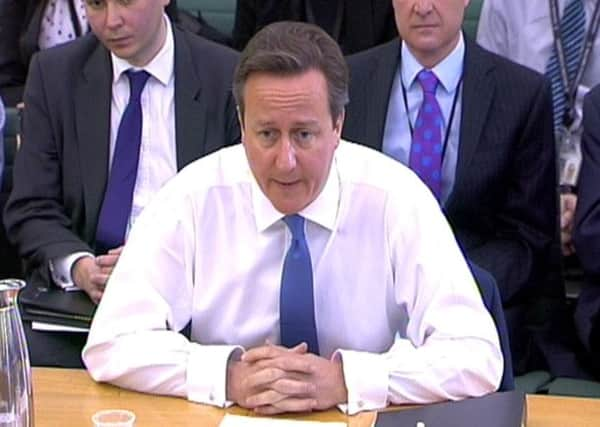Cameron blocks call for local tax


In a confrontational grilling by MPs, Mr Cameron made clear his plans to devolve new powers to major English city regions will not copy similar plans in Scotland for new tax-raising powers, leaving city leaders dependant upon Whitehall for money. At a Commons Liaison Committee meeting yesterday, Sheffield South-East MP Clive Betts asked the PM why the measures announced so far have “all been about devolving spending powers, not tax-raising powers?”
A defensive Mr Cameron told the Labour MP he was “ignoring the English votes for English laws question” and said the “answer is no” to handing councils the power to introduce new taxes, adding: “We’ve got enough taxes in this country, I do not want to see reams of more taxes.”
Advertisement
Hide AdAdvertisement
Hide AdMr Betts maintained there is strong support for cities having control over local tax levels, similar to devolution powers set to be enjoyed by the Scottish Government.
But Mr Cameron accused the MP of “being churlish” and ignoring the work already done to hand powers to cities such as Manchester, adding: “If you have a plan for giving cities the power to whack up council tax, that’s fine. Put it in your manifesto.”
Mr Cameron went on to rule out reform of the Barnett formula which dictates public spending levels in the nations of the UK and is widely seen to favour Scotland. He said its importance would diminish over time as more tax-raising powers were devolved to the Scottish Parliament and the Welsh Assembly, and that reform would not see significant funds flow back to England.
“I don’t think that reform of Barnett is on the horizon,” he said. “To English colleagues, don’t expect there is some massive pot of gold in Barnett reform. I don’t think there is.”
Advertisement
Hide AdAdvertisement
Hide AdMr Cameron said he believed that responsibility for the state pension should remain at Westminster, but suggested control of other elements of the welfare system could be devolved.
The Prime Minister originally pledged to draw up plans for “English votes for English laws” in the aftermath of the referendum vote. Tories had warned it would be unacceptable for Scottish MPs to carry on voting on legislation which affected only England, while English MPs had no say on similar matters in Scotland.
Mr Cameron told the committee it should be possible to resolve the so-called West Lothian question without establishing a separate English parliament with its own English executive.
The debate took place as Nicola Sturgeon officiality began her term as Scottish First Minister, who said: “Regardless of your politics or your point of view, my job is to serve you.”
Advertisement
Hide AdAdvertisement
Hide AdThe devolution row comes as a senior economist warns in The Yorkshire Post that London is an ally to the northern economy, not an enemy. Andrew Sentance, a senior economic adviser to PwC and former member of the Bank of England’s Monetary Policy Committee, said: “There are a number of other myths surrounding the debate on regional policy in the UK.
One is that holding back London is the way to help other UK cities and regions. This would be a major mistake. The beneficiaries of an attempt to stifle London’s economy would be New York, Paris, Frankfurt, Hong Kong and Shanghai – not Sheffield, Leeds and York.”
Comment: Page 12